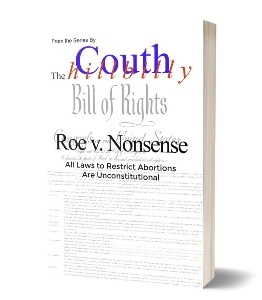 Is money speech? The Money Court says it is. I’m becoming a believer.
Is money speech? The Money Court says it is. I’m becoming a believer.
The deference shown by the Court to those with money was clear with that brilliant joke known as the Citizens United decision.
Today, Roberts and Alito provided further evidence that money is more important than people. I really didn’t think we needed any more proof of the Court’s venality. It’s so blatant they don’t even try to disguise it.
I can’t mention the Citizens United decision without at least a brief comment. If money is speech then those with money get more speech.
Even were we stupid enough to accept the nonsensical lie that corporations are people, giving some ‘people’ more speech than others, transforms the almost sacred tenet of equality under the law into a cruel joke.
Anyway, what did those mental giants, Justices Roberts and Alito, do to embarrass these United States today?
The question was what the consequences would be if the Court struck down the mandate. They mused that it would cause great financial difficulties for the insurance companies to lose all of that income and still be required by other parts of the act to cover preexisting conditions and be barred from dropping sick people.
So, not only do those ‘people’ with more money get more speech, they also jump to the head of the line for consideration of their problems. After getting to the head of the line, they get to stay there.
If the subject is medical care, and ‘corporate people’ rarely avail themselves of health care, would it not be normal to first ask what the impact would be on real people? You know – the sick.
 If the Court takes away coverage from the additional 15 million to be added to Medicaid, the millions of family members past school age but not yet 26 years of age that are already benefiting, those with preexisting conditions, some of whom are already covered, and several other, smaller groups, what will be the effect? That was not the 1st question they asked. It wasn’t the 2nd question they asked. It wasn’t among the questions they asked. You asked about their priorities? Oh, you didn’t need to.
If the Court takes away coverage from the additional 15 million to be added to Medicaid, the millions of family members past school age but not yet 26 years of age that are already benefiting, those with preexisting conditions, some of whom are already covered, and several other, smaller groups, what will be the effect? That was not the 1st question they asked. It wasn’t the 2nd question they asked. It wasn’t among the questions they asked. You asked about their priorities? Oh, you didn’t need to.
There is much speculation about severability. Usually, in any bill of even minimal complexity, legislators include a severability clause. That means, the legislature is saying that, if any part of the law is overturned, the remainder remains in effect.
The bill that became the Affordable Care Act (aka Obamacare) had such a clause. For some reason it was removed before enactment. It may be that someone wanted to play a game of chicken; daring the courts to revoke the entire act. Without an inside source, the reason for such an unusual move is mere conjecture.
Still, though the courts are restrained by a severability clause, many think that without one the entire act must fall. I am far from convinced that any court would see themselves as so constrained on such an important case. They may or may not sever, if they rule against the mandate, of course. At this point, that remains another real question. It is not a given.
Some argue that it would be preferable for Obama if the entire act failed. The idea is that it would so energize his base and moderates that he would easily win and bring in sizable majorities in both houses of Congress. Perhaps. But, that is a considerable gamble.
The worse outcome is the likeliest; a 5-4 decision in either direction.
None of this would be of concern had they just expanded Medicare for everyone. I’m pessimistic. I think that if Obama had ¾ Democrats in both houses the lobbyists and their puppeteers still would have too great a hold on both parties to pass it.

.
.




You are absolutely correct that the Congress (and the administration) should have expanded Medicare to cover everyone. There are no Constitutional issues there. They tax everyone and everyone is covered. Obviously, too simple for a politician to embrace. Having said that, I am torn on the issue being considered by the SCOTUS now. While I like the idea of coverage for everyone, I do have a problem with the precedent that government can force citizens to buy something whether they want it or not. It’s almost a matter of semantics, since the end result is about the same, but taxing… Read more »
Almost total agreement. The problem is requiring someone to purchase from a private corporation. That said, the government requires us to pay for not just Medicare but Medicaid, Social Security and much more. I am forced to pay for wars and other things that I find absolutely abhorrent. I therefor have little truck for those complaining about paying for birth control or such. My advice to them is, ‘live with it.’ That is the price of living in a civilized society. The discussion before the Court has degenerated to farce with the talk of broccoli and such. I never expected… Read more »